|
|
|
Sort Order |
|
|
|
Items / Page
|
|
|
|
|
|
|
| Srl | Item |
| 1 |
ID:
145248
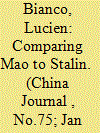

|
|
|
|
|
| Summary/Abstract |
The Greek historian Plutarch famously compared over 40 illustrious Greek and Roman men. This article merely compares two tyrants—Stalin and Mao. Whereas Alexander and Caesar, or Demosthenes and Cicero, lived centuries apart, Stalin and Mao were contemporaries. Rather than recalling their uneasy relationship, this study evaluates and compares three aspects of their performance and misdeeds. As Stalin and Mao were responsible for the deaths of more of their own people than the average tyrant, the study first compares their cruelty and argues that Mao was much less cruel and, second, much less efficient and prone to pursue mutually contradictory aims. Third, he proved more faithful to revolutionary ideals. Two periods during their rule, the Great Terror (1937–38) and the Cultural Revolution, are recalled in order to illustrate the points under discussion.
|
|
|
|
|
|
|
|
|
|
|
|
|
|
|
|
| 2 |
ID:
175971
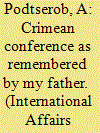

|
|
|
|
|
| Summary/Abstract |
MY FATHER, Boris Fyodorovich Podtserob, was the senior assistant of the People's Commissariat of Foreign Affairs of the Soviet Union during the war. This position allowed him to attend a number of historic diplomatic talks. That is how he came to participate in the Yalta Conference. My father did not leave written memoirs, but he used to tell me about the fateful meeting among three of the world's giants.
|
|
|
|
|
|
|
|
|
|
|
|
|
|
|
|
| 3 |
ID:
157425
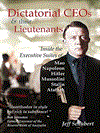

|
|
|
|
|
| Publication |
Australia, Ocean Publishing, 2006.
|
| Description |
320p.pbk
|
| Standard Number |
1920783652
|
|
|
|
|
|
|
|
|
|
|
|
Copies: C:1/I:0,R:0,Q:0
Circulation
| Accession# | Call# | Current Location | Status | Policy | Location |
| 059306 | 923/SCH 059306 | Main | On Shelf | General | |
|
|
|
|
| 4 |
ID:
030783


|
|
|
|
|
| Publication |
London, Radius, an imprint of century Hutchinson Limited, 1988.
|
| Description |
xii, 176p.hbk
|
| Standard Number |
0091732026
|
|
|
|
|
|
|
|
|
|
|
|
Copies: C:1/I:0,R:0,Q:0
Circulation
| Accession# | Call# | Current Location | Status | Policy | Location |
| 030455 | 947.0854/LEW 030455 | Main | On Shelf | General | |
|
|
|
|
| 5 |
ID:
045783


|
|
|
|
|
| Publication |
Ithaca, Cornell University Press, 1972.
|
| Description |
xii, 450p.hbk
|
| Standard Number |
0801406676
|
|
|
|
|
|
|
|
|
|
|
|
Copies: C:1/I:0,R:0,Q:0
Circulation
| Accession# | Call# | Current Location | Status | Policy | Location |
| 010442 | 947.085/ROT 010442 | Main | On Shelf | General | |
|
|
|
|
| 6 |
ID:
044688
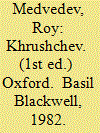

|
|
|
|
|
| Edition |
1st ed.
|
| Publication |
Oxford, Basil Blackwell, 1982.
|
| Description |
xi, 292p.hbk
|
| Standard Number |
0631129936
|
|
|
|
|
|
|
|
|
|
|
|
Copies: C:1/I:0,R:0,Q:0
Circulation
| Accession# | Call# | Current Location | Status | Policy | Location |
| 021912 | 947.08520924/MED 021912 | Main | On Shelf | General | |
|
|
|
|
| 7 |
ID:
139270
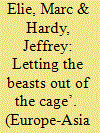

|
|
|
|
|
| Summary/Abstract |
After a lapse of 15 years under Stalin, parole was reintroduced into the Soviet Gulag in 1954. For justice officials anxious to expunge Stalin's repressive legacy, the resurrection of parole signalled a return to correctionalism, societal oversight over the Gulag, and a vastly reduced rate of incarceration. In practice, though, parole exposed significant continuities with the Stalinist Gulag, including endemic corruption, overwhelming concern with production, suspicion of outside interference in penal affairs, and constant upward pressure on the inmate population. In the broader view, the experience of parole in the post-war USSR aligned closely with that of the Western world.
|
|
|
|
|
|
|
|
|
|
|
|
|
|
|
|
| 8 |
ID:
064212


|
|
|
|
|
| Publication |
London, Jonathan Cape, 2005.
|
| Description |
xi, 814p.: ill., maps, abbre.hbk
|
| Standard Number |
9780679746324
|
|
|
|
|
|
|
|
|
|
|
|
Copies: C:2/I:0,R:0,Q:0
Circulation
| Accession# | Call# | Current Location | Status | Policy | Location |
| 049811 | 951.05/CHA 049811 | Main | On Shelf | General | |
| 054462 | 951.05/CHA 054462 | Main | On Shelf | General | |
|
|
|
|
| 9 |
ID:
165428


|
|
|
|
|
| Summary/Abstract |
States use repression to enforce obedience, but repression—especially if it is violent, massive, and indiscriminate—often incites opposition. Why does repression have such disparate effects? We address this question by studying the political legacy of Stalin’s coercive agricultural policy and collective punishment campaign in Ukraine, which led to the death by starvation of over three million people in 1932–34. Using rich micro-level data on eight decades of local political behavior, we find that communities exposed to Stalin’s “terror by hunger” behaved more loyally toward Moscow when the regime could credibly threaten retribution in response to opposition. In times when this threat of retribution abated, the famine-ridden communities showed more opposition to Moscow, both short- and long-term. Thus, repression can both deter and inflame opposition, depending on the political opportunity structure in which post-repression behavior unfolds.
|
|
|
|
|
|
|
|
|
|
|
|
|
|
|
|
| 10 |
ID:
157113


|
|
|
|
|
| Publication |
London, I B Tauris, 2017.
|
| Description |
xii, 228p.hbk
|
| Standard Number |
9781784537739
|
|
|
|
|
|
|
|
|
|
|
|
Copies: C:1/I:0,R:0,Q:0
Circulation
| Accession# | Call# | Current Location | Status | Policy | Location |
| 059275 | 327.12047/MAC 059275 | Main | On Shelf | General | |
|
|
|
|
| 11 |
ID:
076254


|
|
|
|
|
| Publication |
New Delhi, Pentagon Press, 2007.
|
| Description |
xix, 206p.hbk
|
| Standard Number |
8182742676
|
|
|
|
|
|
|
|
|
|
|
|
Copies: C:1/I:0,R:0,Q:0
Circulation
| Accession# | Call# | Current Location | Status | Policy | Location |
| 052321 | 951.705/BAT 052321 | Main | On Shelf | General | |
|
|
|
|
| 12 |
ID:
181203
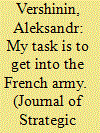

|
|
|
|
|
| Summary/Abstract |
This article is about the first attempts of Soviet-French rapprochement in the military sphere in the early 1930s. It is based largely upon unpublished documents from the Soviet foreign policy (AVPRF), military (RGVA) and the communist party (RGASPI) archives in Moscow. It contends that for the top leadership of the USSR the political rapprochement with France did not necessarily lead to making a fully-fledged military alliance. Despite the attitude of Soviet diplomats in Paris, Moscow remained distrustful of the French. It considered military cooperation with them as a way to reinforce the Red Army and strengthen international positions of the USSR without taking excessive obligations.
|
|
|
|
|
|
|
|
|
|
|
|
|
|
|
|
| 13 |
ID:
159259
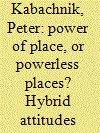

|
|
|
|
|
| Summary/Abstract |
This article explores the hybridity of commemoration by analysing people’s attitudes to three types of contested Soviet symbols in post-Soviet Georgia. I draw on 62 in-depth qualitative interviews conducted in 2012–2013 with Georgians in Tbilisi, Georgia. These interviews focused on what people thought about places of memory, Soviet symbols in public space, and memory politics and policies in contemporary Georgia. I examine their opinions of three different types of reminders of the Soviet past in public space: general Soviet symbols; street names; and the Stalin monument in Gori. This analysis reveals their diverse understandings of place and highlights the hybridity of their responses to the different elements of Soviet symbolism. This not only prevents one from creating ideal typologies when considering places of memory, but also highlights the impact of the form and location of the symbol. I also identify two ways that people conceptualize place, one that recognizes the power of place, and the other that perceives place as powerless.
|
|
|
|
|
|
|
|
|
|
|
|
|
|
|
|
| 14 |
ID:
185468
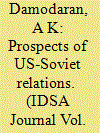

|
|
|
| 15 |
ID:
140888


|
|
|
|
|
| Edition |
1st ed.
|
| Publication |
London, Macdonald and Co. (Publishers) Ltd., 1970.
|
| Description |
217p.: ill.hbk
|
|
|
|
|
|
|
|
|
|
|
|
Copies: C:1/I:0,R:0,Q:0
Circulation
| Accession# | Call# | Current Location | Status | Policy | Location |
| 004913 | 947/TAR 004913 | Main | On Shelf | General | |
|
|
|
|
| 16 |
ID:
027324
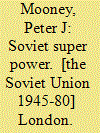

|
|
|
|
|
| Publication |
London, Heinemann Educational Books., 1982.
|
| Description |
vii, 210p.hbk
|
| Standard Number |
043531601X
|
|
|
|
|
|
|
|
|
|
|
|
Copies: C:1/I:0,R:0,Q:0
Circulation
| Accession# | Call# | Current Location | Status | Policy | Location |
| 020167 | 947.085/MOO 020167 | Main | On Shelf | General | |
|
|
|
|
| 17 |
ID:
045801
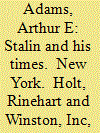

|
|
|
|
|
| Publication |
New York, Holt, Rinehart and Winston, Inc, 1972.
|
| Description |
x, 243p.pbk
|
| Standard Number |
0030850940
|
|
|
|
|
|
|
|
|
|
|
|
Copies: C:1/I:0,R:0,Q:0
Circulation
| Accession# | Call# | Current Location | Status | Policy | Location |
| 011048 | 947.0842/ADA 011048 | Main | On Shelf | General | |
|
|
|
|
| 18 |
ID:
044868
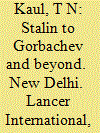

|
|
|
|
|
| Publication |
New Delhi, Lancer International, 1991.
|
| Description |
xxviii, 301p.hbk
|
| Standard Number |
8170621291
|
|
|
|
|
|
|
|
|
|
|
|
Copies: C:1/I:0,R:0,Q:0
Circulation
| Accession# | Call# | Current Location | Status | Policy | Location |
| 032983 | 947.0854/KAU 032983 | Main | On Shelf | General | |
|
|
|
|
| 19 |
ID:
171851


|
|
|
|
|
| Summary/Abstract |
The drama of the National Front in Iran in 1951–53 occupies an important place in international history. Although Iran never was a colony, its struggle against the United Kingdom for control of oil had a radical impact on the process of decolonization in the Eastern hemisphere. It was also in Iran where anti-colonial passions intersected with the Cold War and the agenda of three great powers: the United Kingdom, the United States, and the Soviet Union. Last, but not least, the U.S.-British collaboration and joint overthrow of the Iranian nationalist leader Dr. Muhammed Mosaddeq in August 1953 set a model for Western approaches to radical nationalism in the Third World for at least two decades to follow.
|
|
|
|
|
|
|
|
|
|
|
|
|
|
|
|
| 20 |
ID:
158216
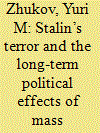

|
|
|
|
|
| Summary/Abstract |
Repression has a long-term negative effect on political participation. Using millions of arrest records from archival documents, and polling station-level election results, we examine how exposure to Stalin-era repression affects voter turnout in Putin’s Russia. To estimate the effect of repression on voting, we exploit exogenous variation in repression due to the structure of mid-century Soviet railroads, and travel distances to prison camps. We find that communities more heavily repressed under Stalin are less likely to vote today. The electoral legacy of Stalin’s terror – decades after the Soviet collapse, and across multiple election cycles (2003–12) – is systematically lower turnout. To show that our result is not unique to the Putin regime, we replicate our analysis in Ukraine (2004–14), and find similar patterns. These results highlight the negative consequences of repression for political behavior, and challenge the emerging view that exposure to violence increases political engagement. While past research has emphasized the short-term effects of repression over several months or years, we show that these effects may be durable over generations and even changes of political regime. Our findings also demonstrate that repression need not be collective or indiscriminate to have community-level effects.
|
|
|
|
|
|
|
|
|
|
|
|
|
|
|
|
|
|
|
|
|